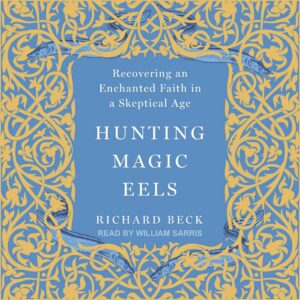 Summary: A discussion of the problem of disenchantment in Christianity.
Summary: A discussion of the problem of disenchantment in Christianity.
It has been several years since I have picked up one of Richard Beck’s books. I am a fan of his and would highly recommend the previous books I have read: Unclean (about hospitality), Slavery of Death (about the power of sin), Reviving Old Scratch (about the importance of the concept of evil) and Trains, Jesus and Johnny Cash (a gospel according to type of book).
Primarily, Hunting Magic Eels is about the problem of disenchantment in the modern world. There is an irony that we are disenchanted with Christianity, but not necessarily all enchantment (crystals, ghosts, etc.) He describes the problem well and in a way that others also have lamented. The traditional distant God as a watchmaker who created but is no longer needed or God in a two-story world (God exists but doesn’t interact except occasionally) is insufficient for historic Christianity.
Karl Rahner, in a famous sermon he preached in literal rubble at the end of the Second World War, has an even more famous quote: “The Christian of the future will be a mystic, or he will not exist at all.” I read that sermon on mysticism in a class. What Rahner meant there was mystic in the sense of enchantment. A disenchanted Christianity is a purely intellectual or moral system. But Christianity, while having intellectual and moral aspects, believes that God is real and is relational. A religious system that is only moral and/or intellectual has ceased to be Christian because it has removed the relational aspects from the faith. This is the positive sense of the quote, “Christianity is about a relationship, not a religion.”
One of the questions not brought up, but which I think is important, is for Christians who have not had some mystical experience. Alan Jacobs grappled with this in a blog post, which I cannot find now. And this book is weaker for not having grappled with it.
But the main focus is trying to facilitate enchantment by spiritual and corporate practices, such as paying attention, spiritual direction, Ignatius, etc.
Beck’s overly rationalistic faith was revitalized by being with people unlike him (prison ministry) and in a church-oriented toward charismatic and pentecostal practices. He did not stop using his rational faculties, and he did not completely absorb all of the practices at his new church, but there was a new sense of being open to God in ways that he was not oriented to in his old life.
Hunting Magic Eels made something click without the book making an explicit connection. There has been an ongoing discussion about the role of understanding people who vote for Trump or who identify as Christian nationalists. It is always essential to understand the why behind people’s positions. But there is some limit to self-identification; we do not always know why we do things when they are part of a larger cultural trend.
This is a silly example, but it did not just happen that a bunch of people in the 1970s loved green, yellow, and orange appliances and shag carpets. There were both technological changes that allowed for different colors to be used in manufacturing and cultural trends that helped choose which colors were chosen as popular. You may not have chosen avocado green if you had an entire color palette, but if you had three colors and the options were white, silver, and avocado green, you may have chosen the green because you did not want white or silver. If you were polled, you might have said you picked it because it was your favorite color, but a look at the broader trends can help us understand why broader trends made those options available.
In looking at the role of enchantment/disenchantment in modern life, Richard Beck rightly identifies that we want to be part of something. At least part of the desire for enchantment is an innate desire to be part of a group, movement, or identity larger than yourself. And it seems to me that at least part of the draw for Trump or Christian nationalism that those who are followers may not self-identify is the role of belonging. When we are in a disenchanted world, our sense of belonging is part of what we can do to re-enchant the world around us. David Brooks commented in an interview about his Second Mountain something that has stuck with me. Brooks said that the difference between community and tribalism is that community is built around loving something in common, while tribalism is built around hatred or opposition to a thing, person, or idea. There is an enchantment in either loving or hating something with others. One of the roles in which the church may not have taken enough of a role in discipleship is directing that love or hatred in the right direction. But it isn’t simply about love/hatred; it is about encouraging people to embrace a sense of enchantment explicitly in the right things so that the need for enchantment is being met with things that are good and not through bad things.
Hunting Magic Eels: Recovering an Enchanted Faith in a Skeptical Age by Richard Beck Purchase Links: Paperback, Kindle Edition, Audible.com Audiobook